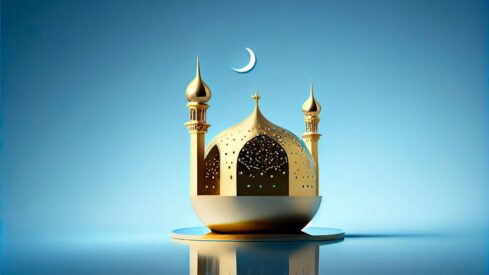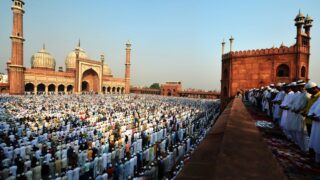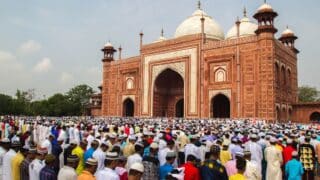Discover the deeper understanding of Eid in Islam beyond its festive celebrations. Eid embodies profound teachings and spiritual renewal, offering Muslims valuable insights into gratitude, compassion, and unity. In this article, we delve into the multifaceted meaning of Eid and its relevance to contemporary Muslim life.
Celebrations of Eid are manifestations of joy in our religion and one of its sanctified rituals which imply great lessons, lofty meanings, and magnificent connotations that are seldom realized by other nations.
Eid in its religious connotation symbolizes expression of thanks to Almighty Allah for enabling the believers to complete their acts of worship [i.e., fasting Ramadan before `Eid Al Fitr and the rituals of Hajj before `Eid Al Adha.] This thankfulness is not only verbally expressed but is also deeply rooted in the believers’ hearts, demonstrated in their feelings of satisfaction and reassurance, and reflected in their joyful and enjoyable celebrations of Eid. These feelings of happiness and cheerfulness fill the hearts of believers and remove the bad feelings among the rich and poor.
Eid has also a humanitarian connotation. It represents a kind of unity between the powerfulness of the rich and the weakness of the poor, where both realize the feelings of love, mercy and justice that stem from the revelations of this religion as manifested in Zakah, giving in charity and benevolence.
Eid: A Celebration of Gratitude
`Eid teaches the rich who live in luxury how to forget their attachment to money, how to overlook their high status and show humbleness to the Creator and Creation, remembering that all people are brethren and supporters of one another. In this way, they may wipe out a year’s sins with acts of benevolence of only one day [i.e., the day of `Eid].
The `Eid also shows its positive influence on the destitute. When `Eid comes, the poor give up their concerns, revive their hopes, and forget the pains and hardships of the year. The joyfulness of `Eid removes the effects of envy and boredom of life from their souls; and the impulses of despair in their hearts get defeated, while the motives of hopefulness assume victory.
`Eid has also a psychological dimension, as it symbolizes a separating line between the believers’ submitting to the restraints of the rituals they would observe before `Eid and the freedom of enjoying the lawful amusements appealing to one’s appetite during `Eid.
In terms of span of time, `Eid represents a time of forgetting sorrows, putting aside burdens and refreshing of one’s body and mind.
Strengthening Social Bonds through Eid
Socially speaking, `Eid can be said to be a day for the children, when they play joyfully and happily; a day for the poor, when they are given generously; and a day for fastening blood relations and social ties among Muslims and friends, when all exchange visits, show kindness and forgiveness to one another, and revive the feelings of love and closeness among them. It is a day when the noble souls of disputing mates reconcile after difference and mend fences with each other.
This all strengthens social ties among Muslims and found them on love, sincerity and brotherhood. Eid is a time of friendliness, happiness, and recreation.
It also reminds the Muslim community of the rights of the weak and unable, so that all members and families enjoy the joy and blessings of this special day.
The social dimension of Eid is manifestly reflected in legislating Zakat Al-fitr on `Eid-ul-Fitr and slaughtering animals on `Eid-ul-Adha. The Muslims’ doing these acts of charity before `Eid or during the days of `Eid makes all contented on these blissful days. Thus the sun of `Eid rises while all smiling and overwhelmed with happiness.
On Eid recreation finds its way to the tired, life is breathed into the souls of the frustrated and edibles are provided for the destitute.
On Eid unrestrained souls submit themselves to acts of goodness, and even tightfisted people are inclined to acts of benevolence.
Eid: A Time for Reflection and Renewal
On Eid there are regulations that help one restrain one’s whims, and the wisdoms behind which appeal to one’s reason and refine the soul. The memories and parables of `Eid set examples in following the right and doing what is good and imply lessons spotlighting the truth and criterion establishing justice among different kinds of humankind. The objectives of celebrating `Eid extend to maintaining the unity of the nation and reforming peoples’ affairs, and contain applied noble lessons in sacrifice, altruism, and love.
During `Eid, feelings of sincerity are spread among all Muslims as they exchange heartily loving gifts as if `Eid infuses the one family spirit in the whole nation.
During `Eid, the spirit of brotherhood spreads among neighbors along the country to the extent that one feels as if the whole country had become one house for its people.
During `Eid every one becomes at ease and feels at home, giving voice to his/her pure affections and inclinations.
`Eid in Islam is a symbol of tranquility and serenity, when Muslims glorify Allah the One the Almighty and restrain themselves from falling into sins and thus entering the Hell Fire.
In addition, `Eid is a field for us to vie one another in doing good.
The great merit of the two `Eids in Islam actually stems from the fact that each of them is related and attached to a religious and highly spiritual season of great social, philanthropic, benevolent and merciful influence on Muslims. These spiritual seasons have also their profound individual and collective disciplinary impacts, without which the Muslim Nation will not be entitled to assume its useful role in the universe.
`Eid Al-Fitr blissfully culminates the blessed month of Ramadan and is actually an expression of gratitude to Allah the Almighty for enabling us to complete this blessed month, while `Eid Al Adha is a part of the great season of Hajj and during which a lot of Hajj rituals are performed.
This divine link between the two `Eids of Islam and these two great religious seasons clearly shows the religious importance and mood of `Eids. All rituals of `Eids and even the amiable worldly adornments and entertainments allowed to be enjoyed during days of `Eids such as wearing new clothes, putting on perfume, taking children on picnics, showing hospitality to guests, expressing cheerfulness, eating delicious dishes and playing without exceeding the limits or deviating from the right are also rewardable good deeds since they are done in good will for Allah’s sake.
These are only some of the meanings that `Eids in Islam are supposed to impart to Muslims or, rather, the meanings that are to be found by true Muslims. Do we feel these meanings now? Do we experience the sweet impact of offering the acts of worship pertaining to `Eids or do we perform them as a matter of habit and routine?
By Muhammad ibn Ibrahim Al Hamad


















